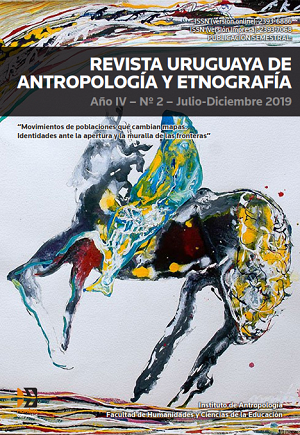What do we do it for? Ethical reflections in the bioantropological labor from the “Identidad y genética” Project
Published 2019-12-12
How to Cite
Abstract
This article seeks to propound an ethic reflection about the bioanthropological tasks through the linkage of the concepts ethics of dissatisfaction (ética de la insatisfacción), integralidad (integrality) and incomodidad (discommodity). We use as an example the Project “Identidad y Genética”, explaining its goals and articulating them with the concepts mentioned, proposing them as a toolbox to approach this area of knowledge from an ethical point of view. It seeks to look for ties with the university’s integral extension model. In sum, it’s an open call to the dialogue and reflection about why, how and from where we investigate in our discipline. An invitation to discuss the ethical dimension about the political and academical aspects of the ancestry studies in Uruguay.
Downloads
References
identidad en Buenos Aires, Argentina. Experiencias desde la búsqueda individual de datos
genéticos. Anales de Antropología Vol. 52(1), 165-177.
Dressler, W. W. (1995). Modeling biocultural interactions: examples from studies of stress
and cardiovascular disease. American journal of physical anthropology, 38(21), 27-56.
Figueiro, G. 2014. Bioarqueología en el Uruguay: situación actual y perspectivas futuras. En:
Luna L, Aranda C, y Suby J (comp). Avances recientes en la bioarqueología latinoamericana,
(47-68) Buenos Aires: Grupo de Investigación en Bioarqueología.
Foucault, M. (2006). Genealogía del racismo. La Plata: Altamira.
Goodman, A. H., Brooke Thomas, R., Swedlund A. C., & Armelagos, G. J. (1988). Biocultural
perspectives on stress in prehistoric, historical, and contemporary population research.
American Journal of Physical Anthropology, Vol 31(9), 169-202.
González-Ramírez, A., & Sáez Sepúlveda, A. (2015). Aportes para una bioarqueología social
y feminista. Revista Atlántica-Mediterránea De Prehistoria Y Arqueología Social,
13(1),81-96.
Gardner, Katy and Lewis, David. (2005) Beyond development? En (comp.) Edelman, M
Haugerud & A. The Anthropology of Development and Globalization: From Classical
Political Economy to Contemporary Neoliberalism. 352-360. Blackwell Publishing Ltd.
Hall, S., Restrepo, E., Walsh, C. E., & Vich, V. (2014). Sin garantías: trayectorias y problemáticas
en estudios culturales. Universidad del Cauca.ç
Instituto Nacional De Estadística. (2016). Encuesta Continua de Hogares 1996/1997 Módulo
Raza. 11/03/2019: http://www.ine.gub.uy/documents/10181/35456/MODULO_RAZA.
pdf/a5ff8903-19a9- 45a2-be66-0c1ae98d4fcf.
Jimeno, M. (2004). La vocación crítica de la antropología latinoamericana. Maguaré 18, 33-58.
Krotz, E. (2002). Sociedades, conflictos, cultura y derecho desde una perspectiva antropológica.
Expropiación liber al. Un ensayo sobre la transformación de recursos locales






